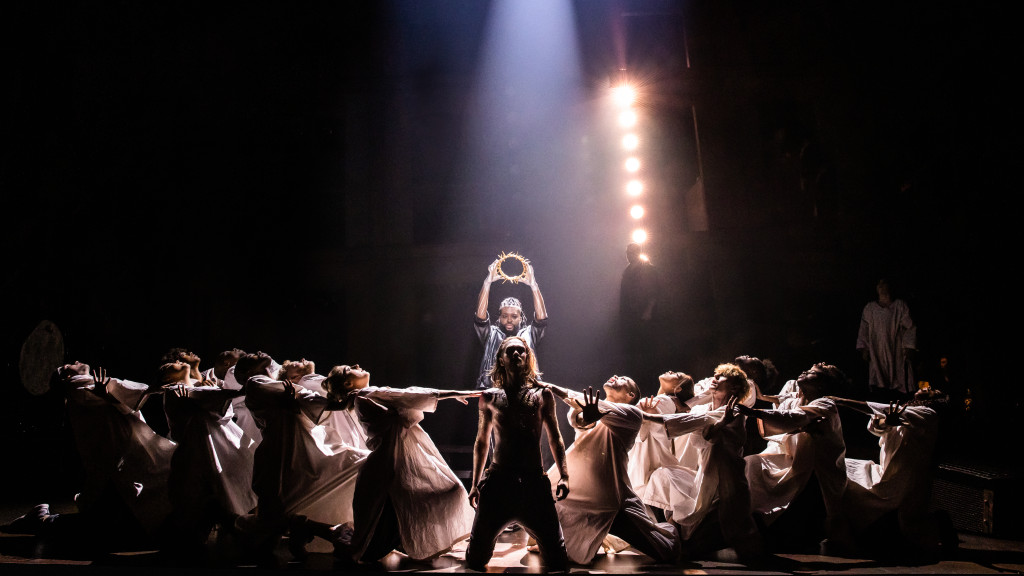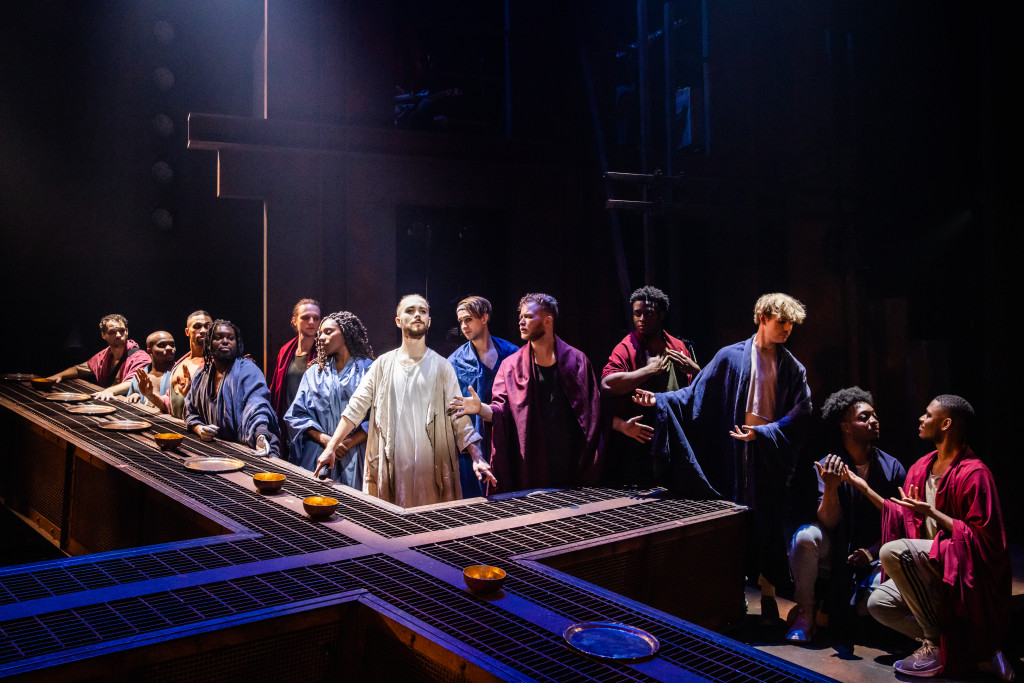Without Judas, there would not be a great story

My parents and I went to see the acclaimed broadway show Jesus Christ Superstar at the Overture Center. They didn’t know what to expect other than the same holy story they heard about Jesus back in Catholic Latin America when they were children. My mother asked me during the show “Is that what I think it is, that looks like the last supper, they are about to eat something?”. My father whispered into my mom’s ear “See, those are the twelve disciples remember, and one of them is Maria Magdalena and yes, that’s the last supper” he told her. “I see, I get it now,” she said. And that’s when things started to make sense to them, and that’s when I started to enjoy the show because they didn’t look so lost.

The score is tough, riding the rails into the stratosphere or scraping the bottom of the scale. It’s rock and roll with a vengeance. The songs should shred even the most trained voices; but somehow, these young top guns survive, and thrive, under the extreme pressure that director Timothy Sheader lays on them. Freddy Mercury, Lady Gaga, and David Bowie come to mind as performers that can sustain high notes and powerful vocal cords. These guys delivered big time.
Two keyboards (Mark Binns and Ryan Wise), bass (Reggie Powe), guitar (Isaac Helgestad), and drums (JImmy Bonaparte-Coggins) – amplified to 21 decibels – set the tone and leave no room for nothing but your A-game as a singer. Jesus (Jack Hopewell), a lean singing machine Christ figure in topknot and earring, dragging around his guitar in a symbolic inverted cross, wails “The Temple” higher and higher never losing the crescendo and melodic line showing tremendous mental toughness.

Judas (Elvie Ellis) doesn’t travel quite so high, but he’s the musical’s center and as such, he has more drama in his songs. “Damned for All Time” and “Judas’ Death,” suits his raspy style just fine.
Mary Magdalene (Faith Jones), the repentant former prostitute that falls in love with Jesus is a delight to hear. Her songs “I Don’t Know How to Love Him” and “Could We Start Again Please?” gives us a softer palette of melodies. Her creamy soprano is exactly right.
The Psychology of Judas and Jesus
Fundamentally, Tim Rice did with this story the same thing that clergy across Wisconsin do every Sunday morning. Minus the distant, foreign culture and spooky language. Rice gives resonance and relevance to the current issues and obstacles we as humans face every day. Emptiness, Friendship Issues, Failure, and Unfair Treatment.
A group of curious religious folks in the rotunda seemed disappointed after the show because I heard them say. “It’s a total far-fetched misrepresentation of the sacred scriptures, it’s nothing but a commercial portrait of Christ — they missed the resurrection of a Christ”.
The Christ that Rice and Lloyd Webber presented at the Overture Center would not have risen from the dead, as both are not men of faith, and their statements only serve to undermine the scriptures. This was not a show about the teachings of Jesus, his divinity and suffering on the cross, or his resurrection. It was a story that asked the simple question, “Why does Judas betray Jesus.” Rice wanted to tell us a new story with a sense of dramatization that the Bible doesn’t have. After the show, we all shared a slice of Pizza at Ian’s and shared our thoughts. My father said “I like this version compared to the movie your mother and I saw back home, I think Rice gives us a proactive Judas and a non-passive-aggressive Jesus,” “The bible depicts rigid characters in an inherently undramatic universe, tossed around by the winds of divine providence and the self-pity and the “poor me” scenario. “ he said. My mother said, “This was my first live crucifixion of Jesus, it touched and opened my heart even more, he did suffer a lot”. I thought the special effects, art, and guitars were off the chain.

From the onset, according to Lloyd Webber’s bio, “the piece was written as a rock album to tell the story through the music itself.” That is, the songs were written and conceived as an album musical before the musical was created and staged. Of course, it was tubular to tell the biblical story in the language of rock and roll. The title song was released as a single and underscored the central point of the entire show. Jesus Christ had become a Superstar, “a shallow, hyped personality worshiped merely for the hype like many pop stars in the 70’s such as Mick Jagger from the Rolling Stones and nowadays Bad Bunny and Shakira…The hype became more important than the message.”
Because it was recorded in the studio before it was staged, “it was originally written for the ears, not the eyes.” As such, the overall structure of “Superstar” feels a little bit chaotic and at the same time peaceful “almost like a series of old MTV music videos rather than one coherent narrative. “In all chaos, there is a cosmos, in all disorder a secret order.” the renowned Carl Jung said once. All that had to be mixed and put on stage boldly because chaos, cosmos, and peace are very much the essence and the secret order of this incredible musical.
In the final analysis, without Judas as the story’s devilish driving force, Rice hints, the “greatest story ever told” wouldn’t have taken place nor been so magnanimous. As the great French writer Jean Cocteau put it “God would never have reached as many people as he did without the Devil’s help” said. Unknowing, backstabbing Judas is responsible for all that has happened ever after.
‘Jesus Christ Superstar
Through Sunday, Feb. 26
Overture Hall, Overture Center, 201 State St.
$25-$129 (plus fees)
overture.org/tickets-events/2022-23-season/jesus-christ-superstar